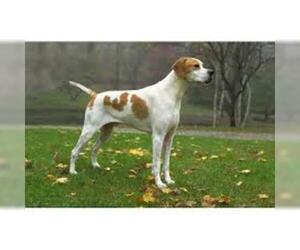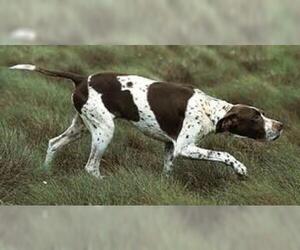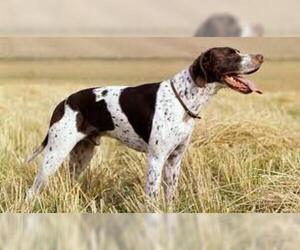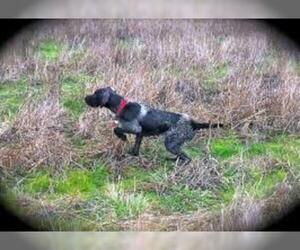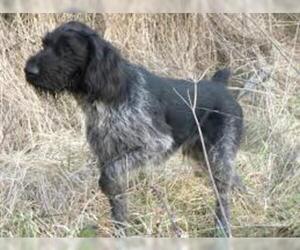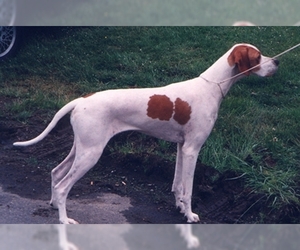
All about Pointer dog breed
A.K.A. :English Pointer, Bird Dog, Gun Dog, Field Pointer, EP, Pointer Pup, Pointer Scout, British Pointer, Hunting Pointer, Smoothcoat Pointer, Pointer Companion, Game Tracker, Sporting Pointer, Classic Pointer, Pointer Flusher
Size
Grooming requirements
Exercise requirements
Good with other dogs
Watchdog ability
Energetic
Training requirements
Playful
Affectionate
Good with other pets
Good with children
Good with strangers
Winter
Summer
Healthiness
Protective
Life Span
| Pure Breeds | Member |
| Breeds A - Z | P |
| Breeds by Group | Gun Dog Sporting |
| Breeds by Trait | Fast Dog Breeds High Stamina Dog Breeds |
| Overview: | The Pointer is a noble and athletic breed, originating in England as a gun dog specifically bred to "point" to game birds. Physically, they are elegant and muscular, boasting a short, dense coat typically white with liver, lemon, orange, or black markings. Their most striking feature is their distinctive "pointer" stance, where they freeze with one foreleg raised and their body directed towards the quarry. Temperamentally, Pointers are known for being friendly, intelligent, and highly energetic. They thrive on activity and require a good deal of exercise, making them best suited for active families or individuals who can provide ample space for them to run, rather than small apartments. While generally robust, some health considerations include hip and elbow dysplasia, and certain eye conditions. With proper training and socialization, a Pointer can be a devoted and affectionate companion. |
F.A.Q.
All You Need to Know About the Pointer Breed
The Pointer, a breed originally from England, is renowned for its elegant, athletic build and exceptional hunting instincts, particularly for bird pointing. These intelligent and loyal dogs possess a friendly and amiable temperament, making them wonderful companions for active families. Pointers typically have a short, dense coat, requiring minimal grooming—a weekly brush is usually sufficient. Their boundless energy means they need substantial daily exercise, including long walks, runs, or engaging in canine sports; they are not well-suited for apartment living unless their exercise needs are rigorously met. While generally healthy, potential owners should be aware of breed-specific concerns such as hip and elbow dysplasia, as well as certain eye conditions. Their trainability and affectionate nature make them a rewarding breed for owners committed to providing the activity and mental stimulation they thrive on.The average weight for an adult Pointer is typically between 45 and 75 pounds. Males generally fall into the higher end of this range, weighing roughly 55-75 pounds, while females are typically 45-65 pounds. This provides a good guide for a healthy weight for a Pointer.
Pointer Height: How Tall is a Pointer?
Curious about the average size of a Pointer? These elegant and athletic dogs typically stand between 23 to 28 inches tall at the shoulder. This measurement represents the typical adult Pointer height, providing a good indication of their physical stature.- Typical Adult Height Range: Most Pointers will fall within the 23 to 28-inch range.
- Gender Variation: While the overall range is quite consistent, male Pointers often tend to be at the higher end of this spectrum, occasionally reaching the full 28 inches, while females might be a bit shorter, often closer to the 23-26 inch mark. However, individual genetics play a significant role, so there can be overlap.
- Individual Genetics: Just like people, Pointers have unique genetic makeups that can influence their exact height. Some individuals might be slightly shorter or taller than the average, even within the same litter.
The Pointer colors are diverse, ranging from traditionally recognized solid and bicolored coats to more unique and exotic Pointer variations.AKC recognized Pointer colors include:* Black: A sleek, solid black.* Lemon: A pale, creamy yellow.* Liver: A rich, dark brown.* Orange: A vibrant, reddish-yellow.* White: A pure, solid white.These solid colors also appear in combinations, creating bicolored Pointers such as:* Black & White* Lemon & White* Liver & White* Orange & WhiteAKC recognized Pointer coat patterns include:* Parti-color: Large, irregular patches of color on a white background.* Patched: Similar to parti-color but with more distinct patches.* Ticked: Small, distinct flecks of color on a white background, giving a "salt and pepper" appearance.* Roan: A fine mixture of colored and white hairs throughout the coat, resulting in a muted, blended color (e.g., Liver Roan, Orange Roan, Lemon Roan).While not officially recognized by the AKC, some rare coat types and exotic Pointer variations occasionally appear, though these may indicate mixed heritage or are simply less common:* Blue: A dilute black, appearing as a grayish-blue.* Dilute colors: Other diluted shades of recognized colors.* Merle: A distinctive pattern of irregular patches of diluted color on a solid or piebald background. This is extremely rare in purebred Pointers and often indicates a crossbreed.* Chocolate: A rich, dark brown, sometimes used interchangeably with Liver but can also refer to a specific genetic shade.* Brindle: A striped pattern.* Fawn: A light, yellowish-brown.When considering a Pointer, prioritize health and temperament. While Pointer colors can influence aesthetic preference and sometimes pricing, AKC recognized Pointer colors are most common, and rare coat types should be verified for purity if breed standard is a concern.
The Pointer personality is marked by an intelligent, good-natured, and noble temperament. These dogs are renowned for their friendliness and unwavering loyalty, forming strong bonds with their families. Pointers are generally sociable and enjoy being part of family activities. While adaptable, their energetic nature means they are not ideally suited for apartment living; they thrive in homes with ample space and regular access to exercise. Their temperament of Pointer makes them generally excellent with children, often displaying patience and a playful spirit. With proper socialization, they can also coexist peacefully with other pets, though their strong prey drive, a remnant of their hunting heritage, means supervision is always wise, especially with smaller animals. Overall, the Pointer is a devoted, active, and affectionate companion for the right owner.
Pointer Temperament & Personality TraitsThe Pointer temperament is renowned for its friendly and affectionate nature, making them wonderful companion dogs. They are highly sociable and thrive on human interaction, forming strong bonds of loyalty with their families. Pointers are generally good with children, especially if raised with them, displaying a patient and playful demeanor. However, due to their size and energy, supervision is always recommended with very young children.Regarding other pets, Pointers can coexist peacefully with cats and other dogs, particularly if introduced properly and socialized from a young age. Their natural hunting instinct might surface with very small, fast-moving animals, but this is often manageable with consistent training.While intelligent and eager to please, the Pointer personality traits can sometimes include a touch of stubbornness, especially if they don't see the immediate benefit of a command. This requires patient and consistent positive reinforcement training. They are also known to be somewhat sensitive to harsh correction, responding best to gentle guidance.Adaptability to apartment living is generally not ideal for Pointers. They are high-energy dogs that require significant daily exercise and space to run. A home with a secure yard is much more suitable to meet their needs and prevent boredom, which can lead to destructive behaviors. They are not typically prone to excessive barking, but will alert their owners to new arrivals.
Pointer Care: Daily Maintenance & Health TipsPointer care involves moderate grooming, significant exercise, and diligent health monitoring. Pointers are not a low-energy dog breed; they require substantial daily activity.Grooming: Their short coat needs minimal daily maintenance, typically a quick brush a few times a week to remove loose hair and maintain shine. Shedding is moderate. Baths are only necessary when dirty. Wrinkle and ear cleaning are essential. Check ears weekly for dirt, redness, or odor, cleaning gently with a vet-approved solution to prevent infections. Pointers are not brachycephalic, so they don't have the same breathing or climate sensitivities as breeds like Pugs, but they still need protection from extreme weather. Trim nails regularly to prevent overgrowth.Exercise: Pointers are high-energy dogs bred for hunting. They need at least 1-2 hours of vigorous exercise daily, ideally off-leash in a secure area. Long walks, runs, hikes, and active play are crucial to prevent boredom and destructive behaviors. Mental stimulation through training and puzzle toys is also important.Dietary Considerations: Feed a high-quality dog food appropriate for their age, activity level, and size. Monitor calorie intake closely as Pointers can be prone to weight gain, leading to other health issues. Avoid overfeeding and limit treats. Weight management is key to their long-term health.Health Tips for Pointer: Be aware of common health concerns. Skin issues can occur; watch for allergies, hot spots, or irritations. Regular dental care, including brushing, is vital to prevent plaque buildup and gum disease. Other concerns include hip and elbow dysplasia, eye conditions, and certain cancers. Regular veterinary check-ups are paramount for early detection and treatment of potential problems. Consistent how to care for a Pointer practices will lead to a healthy and happy companion.
Pointer activity level: Pointers are an active, athletic breed with high energy needs, perfectly suited for active families. They require significant daily exercise, typically 60-90 minutes, which can be broken into several sessions. Their ideal exercise includes running, vigorous play, and structured activities like fetch or agility. Pointers love to play and thrive on engaging with their families, enjoying both high-intensity play and relaxing cuddle sessions. While they possess bursts of incredible speed and stamina, they also balance this with long periods of rest, especially indoors. Due to their brachycephalic (short-nosed) anatomy, Pointers are prone to overheating, so exercise should be carefully monitored, especially in warm weather. Avoid strenuous activity during the hottest parts of the day and ensure constant access to water. They are not suitable for low-energy households or apartment living without dedicated efforts to meet their substantial exercise needs. For those wondering, "how active are Pointers?" the answer is: very active, but adaptable to a balanced indoor/outdoor lifestyle with proper management.
Breed Breakdown: What Experts Say About the Pointer
I would rate the Pointer's "Size" trait a 7.Pointers are clearly not small dogs, but they also don't typically reach the imposing stature of giant breeds like Great Danes or Irish Wolfhounds. They are muscular, athletic dogs with a lean build, standing generally between 23 to 28 inches tall and weighing 45 to 75 pounds. Their body structure is designed for endurance and agility, not extreme bulk. When compared to the average companion dog, which includes many smaller breeds, Pointers are definitely on the larger side.While a Pointer's size doesn't necessarily make them unsuitable for apartment living if their significant exercise needs are met daily outside, they are certainly not the *best* suited. Their active nature and the space they occupy make them more comfortable in homes with a yard or immediate access to large open spaces for running. Similarly, frequent travel, especially in standard carriers or small vehicles, can be challenging due to their dimensions. Households with significant space constraints would find a Pointer to be a very large presence.
I'd rate the Pointer's "Grooming Requirements" at a 2. They are an exceptionally low-maintenance breed when it comes to grooming. Their short, dense, and sleek coat sheds moderately, but it's easily managed with a weekly quick brush-down using a rubber curry brush or a shedding blade to remove loose hair and keep the coat healthy. They don't have undercoats to blow, nor do they develop mats or tangles. Skin folds are not a concern, and their ears, while needing regular checks for cleanliness to prevent infections like any breed, don't require specialized care beyond wiping. Nail trimming is standard for all dogs, and bathing is only necessary when they get particularly dirty, not for coat maintenance. They are not particularly susceptible to skin issues or allergies compared to other breeds, making their overall grooming needs remarkably straightforward and minimal.
I would rate the Pointer's exercise requirements as an 8 out of 10.Pointers possess an extremely high energy level and are bred for endurance and sustained movement, particularly in the field. They are not a breed that thrives with minimal activity; in fact, a lack of adequate exercise can lead to destructive behaviors, anxiety, and a general state of unhappiness. Daily activity recommendations for a Pointer are substantial, typically requiring at least 60-90 minutes of vigorous exercise, often broken into multiple sessions. This isn't just a leisurely stroll; they need opportunities to run, sprint, and engage their hunting instincts. They excel in activities like long-distance running, hiking, biking alongside their owner, and various dog sports such as agility, flyball, and particularly scent work or field trials. Their lean, athletic build and deep chest are indicative of their capacity for sustained physical effort. Unlike brachycephalic breeds, Pointers have no respiratory limitations that would hinder their ability to engage in intense, prolonged exercise. They absolutely require structured routines to stay healthy and mentally stimulated; simply letting them out in the yard for a short period is rarely sufficient. Their mental stimulation is often tied to physical activity, especially if it involves "work" like retrieving or tracking.
I'd rate the Pointer's "Watchdog Ability" at a 3 out of 10.While Pointers are certainly alert and aware of their surroundings, their natural disposition isn't geared towards guarding or territorial defense. They are typically very friendly, even with strangers, and lack the inherent suspicion or protective instincts often found in traditional watchdog breeds. They might bark once or twice at an unfamiliar sound, more out of curiosity or to signal something interesting, rather than a sustained warning or attempt to deter. Their response to an unfamiliar person entering the home would likely be one of enthusiastic greeting rather than cautious observation or aggressive posturing. They are much more of a passive companion, likely to welcome an intruder with a wagging tail rather than providing any meaningful early warnings or deterrent.
I would rate the Pointer's "Good with Other Dogs" trait a 7 out of 10.Pointers are generally known for their amiable and gentle dispositions, which extends to their interactions with other canines. They are typically not an inherently aggressive or dominant breed and often enjoy the company of other dogs, especially when properly socialized from a young age. Their playful nature means they can often adapt well to dogs of various sizes and energy levels, though their own high energy can sometimes be overwhelming for very small or sedentary companions. While they generally thrive in canine company and can integrate well into multi-dog households, they still benefit significantly from early and consistent socialization. Without it, or in situations with very strong-willed or reactive dogs, their natural enthusiasm could be misinterpreted, or they might struggle with social cues. Therefore, while highly sociable, careful introductions and continued positive experiences are still important to ensure peaceful coexistence rather than an automatic, effortless fit in every scenario.
I would rate the Pointer's "Energetic" trait as an 8 out of 10.Pointers are renowned for their exceptional energy levels and stamina, truly embodying the "energetic" descriptor. They are naturally active and possess a tireless drive, a testament to their heritage as gundogs bred for long days in the field. This breed thrives on extensive physical stimulation, requiring daily vigorous exercise to be content and well-behaved. Their endurance is remarkable, allowing them to participate in lengthy outdoor activities like running, hiking, and hunting without quickly fatiguing. Pointers are also incredibly playful, often initiating games and enjoying interactive activities that engage both their bodies and minds. Compared to many other companion dogs, they are significantly more active and require a substantial commitment to exercise to prevent boredom and destructive behaviors. Fortunately, the Pointer is not a brachycephalic breed. Their well-proportioned snouts and open airways contribute to their excellent stamina and exercise tolerance, allowing them to breathe freely even during intense physical exertion without the respiratory limitations that can affect brachycephalic breeds.
I'd rate the Pointer's "Training Requirements" at a 7. While incredibly intelligent and eager to please in the right hands, they are not a beginner-friendly breed. Their high energy, strong prey drive, and independent spirit mean that training them effectively requires significant time, consistency, and a structured routine. They can be very responsive to commands, especially with positive reinforcement, but their attention span can be short-lived if not engaged properly, and their natural desire to hunt can lead to a certain level of stubbornness when their instincts kick in. Without an experienced handler who understands their drive and can channel it into productive training, a Pointer can quickly become a handful. They thrive on clear expectations, consistent boundaries, and plenty of mental and physical stimulation to prevent boredom and undesirable behaviors.
I'd rate the Pointer's "Playful" trait a strong 8 out of 10.Pointers are not just active; they are genuinely enthusiastic and fun-loving dogs. Their typical activity level is high, demanding regular exercise and mental stimulation, which often translates into an eagerness for games. They love to interact with their families and can be quite attention-seeking, often using their charming personalities to initiate play. Their response to toys, especially those that encourage their natural hunting instincts like chasing and retrieving, is incredibly enthusiastic. While they can have an "off switch" and enjoy a good cuddle, their overall enthusiasm in daily life, particularly when it comes to any opportunity for activity or interaction, is very evident. They are naturally spirited and far from laid-back compared to many other companion dogs, thriving on engagement and playful interaction.
I would rate the Pointer's "Affectionate" trait a solid 8 out of 10.While Pointers are undeniably intelligent, athletic, and possess a strong prey drive, they are also deeply people-oriented dogs who crave companionship and show their love readily. They thrive on human interaction and genuinely enjoy being part of the family unit, often following their owners from room to room just to be in their presence. Pointers are known for their loyalty and will form strong bonds with their families. They are also quite sensitive to owner emotions, often picking up on moods and offering quiet comfort. While not typically "lap dogs" due to their size and energy, they will gladly lean into you for pets, rest their head on your lap, and enjoy a good cuddle session on the couch. They are not independent in the way some working breeds might be; a Pointer left isolated or without enough attention can become quite unhappy. They truly thrive on affection and integrate themselves fully into their human pack, demonstrating a loving and devoted nature.
I would rate the Pointer's "Good with Other Pets" trait as a 7 out of 10.Pointers are generally good-natured and, with proper socialization, can coexist peacefully with other dogs. They often enjoy the company of other canines and can thrive in multi-dog households. However, their strong prey drive, bred into them for generations, is a significant factor when it comes to smaller, non-canine pets like cats. While some individual Pointers can learn to live with cats, especially if introduced as a puppy, it requires consistent training, supervision, and an understanding that their instinct to chase may always be present. They typically do not exhibit high levels of resource guarding with other animals, especially if well-fed and provided with their own designated space. Their natural sociability helps them adapt, but successful integration with cats or other small animals heavily relies on early and ongoing socialization and management to mitigate their inherent hunting instincts. While not inherently incompatible, their prey drive necessitates a proactive approach and a cautious introduction to ensure the safety and peace of all pets involved.
Rating: 7/10Pointers, while not the first breed that typically comes to mind when one thinks of "nanny dogs," are generally good with children, earning a solid 7. Their high energy levels, inherent playfulness, and generally amiable disposition make them enjoyable companions for active children. They are typically patient and tolerant of the usual noise and bustle that comes with a house full of kids. However, their size and exuberance, especially in puppyhood, mean they can inadvertently knock over smaller children. While naturally affectionate, consistent training from an early age is crucial to channel their energy positively and teach them appropriate interactions with children. Supervision is always recommended, particularly with very young children, to ensure both the dog and child learn to respect each other's boundaries. They are not naturally gentle to the extent of a Golden Retriever, but with proper guidance and socialization, they can thrive in a family setting, offering a loyal and playful companion for years to come.
I'd rate the Pointer's "Good with Strangers" trait a 9 out of 10.Pointers are generally very sociable and welcoming with unfamiliar adults. They are naturally outgoing and possess a friendly, eager-to-please disposition that extends to people they don't know. While they might offer a polite sniff or a brief moment of assessment, this is usually followed by a wagging tail and an invitation for attention. They are not typically prone to barking or guarding in a defensive way towards strangers, and their adaptability in public or guest-filled environments is excellent, often thriving on the opportunity to meet new people. While good early socialization always helps solidify their natural inclinations, Pointers are inherently disposed to be comfortable and affable with strangers, rather than requiring extensive training to overcome shyness or unfriendliness.
I would rate the Pointer's winter tolerance at a 3.Pointers possess a short, thin coat with very little undercoat, offering minimal insulation against cold temperatures. While they are a medium to large breed, their leaner build generally means less subcutaneous fat compared to more cold-hardy breeds. They are not brachycephalic, which is a positive factor for breathing in cold air, but this doesn't compensate for their poor thermal insulation. They are highly active dogs, and while this can generate some body heat during exercise, prolonged exposure or inactivity in cold weather quickly leads to a significant risk of hypothermia. They are definitely not built for harsh winters and their ability to safely enjoy outdoor activity in cold climates is severely limited without significant intervention.Compared to many other companion dogs, Pointers absolutely require special care during winter months. They are much more sensitive to cold than breeds with thicker coats like Huskies, Labradors, or even many mixed breeds. They will need warm dog coats or sweaters for outdoor excursions, even in moderately cool temperatures, and their time outdoors should be closely monitored and limited. They are much more prone to shivering and seeking warmth, indicating their discomfort quickly. Owners in cold climates will need to be diligent about providing a warm, insulated indoor environment and ensuring they are not left outside for extended periods.
I would rate the Pointer's "Summer" tolerance at a 6 out of 10. While not extremely sensitive, they are not highly heat-tolerant either. Pointers possess a medium-length coat and a non-brachycephalic structure, which aids in better airflow and heat dissipation compared to short-nosed breeds. They are energetic and bred for sustained activity, meaning their bodies are designed to work, but this also means they can readily overheat if not managed properly. They have an average ability to regulate body temperature for a canine, but their drive to run can easily override early signs of heat stress. The risk of heatstroke is present, especially during strenuous activity or prolonged exposure to high temperatures and humidity. Pointers can enjoy outdoor activities in the summer, but these should be limited to cooler parts of the day, such as early mornings or late evenings. During the hottest parts of the day, they absolutely require access to shade and plenty of fresh water, and ideally, indoor climate control is beneficial. Compared to many companion dogs, Pointers require more active management during summer due to their activity drive. Owners must be vigilant about monitoring their dog's energy levels, panting, and seeking shade, as their enthusiasm might lead them to push past safe limits without intervention.
I would rate the Pointer's "Healthiness" trait as an 8 out of 10.Pointers are generally considered a robust and healthy breed. They boast a respectable average life expectancy of 12-15 years, which is on the higher end for a medium-to-large breed. They aren't prone to the severe breathing difficulties seen in brachycephalic breeds, nor do they typically suffer from the widespread skin allergies or joint issues that plague many other popular dog breeds with more extreme conformations.While they do have some genetic predispositions, such as hip and elbow dysplasia (common in many active, larger breeds) and certain eye conditions like progressive retinal atrophy, responsible breeders actively screen for these issues, significantly reducing their prevalence. They are not considered a high-maintenance breed in terms of health, often requiring standard veterinary care and preventative measures. Their athletic build and energy levels contribute to their overall resilience, and with a proper diet, exercise, and routine vet check-ups, they tend to remain healthy throughout their lives. Compared to many companion dogs, Pointers are notably hardy.
I would rate the Pointer's "Protective" trait at a 3 out of 10.While Pointers are incredibly loyal to their owners and certainly alert to unusual sounds or sights, their natural inclination is generally not towards overt protection. They might bark to signal an unfamiliar presence, making them moderately effective as a "doorbell" or alert system (a watchdog), but their friendly and even-tempered nature means they're far more likely to greet a stranger with curiosity or a wagging tail than with aggressive intent. They lack strong territorial instincts that would drive them to confront an intruder, and their gentle disposition makes them highly unsuitable as a guard dog. Their primary role is that of an energetic and devoted companion dog, exceliling in the field and as a family member rather than offering meaningful physical protection in a household setting.
I'd rate the "Life Span" trait of the Pointer breed a 7.Pointers are generally considered to have an average to slightly above-average lifespan for a medium to large-sized dog breed, typically living between 12 to 14 years. While not reaching the exceptional longevity of some smaller breeds, they tend to outlive many of their larger canine counterparts. They are generally robust dogs, and responsible breeding practices help to minimize genetic predispositions to serious health issues, though like many breeds, they can be prone to certain conditions like hip and elbow dysplasia, eye conditions, and certain cancers in their later years. With good nutrition, regular exercise, and appropriate veterinary care, a Pointer has a good chance of enjoying a long and active life. Compared to other companion dogs, they are generally considered to be average to moderately long-lived.
Pointer Dogs for adoptionSee all dogs for adoption
Pointer BreedersSee all breeders
Similar Dog Breeds for Pointer
Breed Mixes of Pointer
Quick Breed Selector 0 - not important, 1 - smallest, 10 - largest
Variants & Mistakes :Poainter, Pointar, Pointr, Poiner, Poinnter, Poinnterr, Poynter, Poynterr, Pointerr, Pointur, Pounter, Poanter, Poimter, Pointers, Poiinter, Poienter, Poyinter, Pointher, Pintar, Pinter, Pintur, Poinert, Poinetr, Poinrt, Poinr
